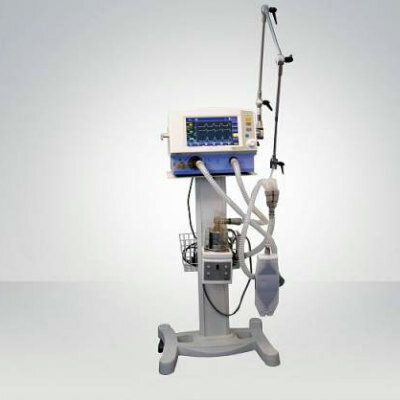New Angioplasty System Alleviates Peripheral Artery Disease
|
By HospiMedica International staff writers Posted on 10 Feb 2021 |

Image: The Selution sustained limus release balloon (Photo courtesy of MedAlliance)
A novel sirolimus-eluting balloon (SEB) treats long tibial occlusive lesions in peripheral artery disease (PAD) patients with critical limb ischemia (CLI).
The MedAlliance (Nyon, Switzerland) Selution sustained limus release (SLR) balloon technology is based on unique micro-reservoirs made from a biodegradable polymer intermixed with the anti-restenotic drug Sirolimus. The manufacturing process for the SEB micro-reservoirs results in millions of miniature, precisely formed, drug delivery pods, of uniform size and with the same drug elution properties. The micro-reservoirs bind to the surface of the SEB, using a proprietary cell adherent technology (CAT) process.
This mixes the micro-reservoirs with amphiphatic lipids--containing both positive and negative ions--that envelop them to ensure they remain on the SBE during its insertion into the artery and delivery to the lesion. Once expanded, the amphiphatic lipid carrier is attracted to negatively charged membranes in the endothelial cells, resulting in adhesion of the micro- reservoir coating, and subsequently providing the controlled, sustained release of the drug. After more than 90 days, the micro-reservoirs are fully biodegraded, and the vessel is returned to its natural state, with nothing left behind.
“Selution SLR is designed to deliver the same safety and performance as best-in-class drug eluting stent technology, with the added benefit of leaving nothing behind,” said Jeffrey Jump, chairman and CEO of MedAlliance. “Our breakthrough technology has shown to be effective and safe in below the knee diseases in highly complex patients.”
Sirolimus is a macrolide rapamycin (mTOR) macrocyclic lactone inhibitor used to coat coronary stents, prevent organ transplant rejection, and treat a rare lung disease called lymphangioleiomyomatosis. It is naturally produced by the bacterium Streptomyces hygroscopicus and was isolated for the first time in 1972 by Surendra Nath Sehgal from samples found on Easter Island, which led to its original name, rapamycin after the native name of the island, Rapa Nui.
Related Links:
MedAlliance
The MedAlliance (Nyon, Switzerland) Selution sustained limus release (SLR) balloon technology is based on unique micro-reservoirs made from a biodegradable polymer intermixed with the anti-restenotic drug Sirolimus. The manufacturing process for the SEB micro-reservoirs results in millions of miniature, precisely formed, drug delivery pods, of uniform size and with the same drug elution properties. The micro-reservoirs bind to the surface of the SEB, using a proprietary cell adherent technology (CAT) process.
This mixes the micro-reservoirs with amphiphatic lipids--containing both positive and negative ions--that envelop them to ensure they remain on the SBE during its insertion into the artery and delivery to the lesion. Once expanded, the amphiphatic lipid carrier is attracted to negatively charged membranes in the endothelial cells, resulting in adhesion of the micro- reservoir coating, and subsequently providing the controlled, sustained release of the drug. After more than 90 days, the micro-reservoirs are fully biodegraded, and the vessel is returned to its natural state, with nothing left behind.
“Selution SLR is designed to deliver the same safety and performance as best-in-class drug eluting stent technology, with the added benefit of leaving nothing behind,” said Jeffrey Jump, chairman and CEO of MedAlliance. “Our breakthrough technology has shown to be effective and safe in below the knee diseases in highly complex patients.”
Sirolimus is a macrolide rapamycin (mTOR) macrocyclic lactone inhibitor used to coat coronary stents, prevent organ transplant rejection, and treat a rare lung disease called lymphangioleiomyomatosis. It is naturally produced by the bacterium Streptomyces hygroscopicus and was isolated for the first time in 1972 by Surendra Nath Sehgal from samples found on Easter Island, which led to its original name, rapamycin after the native name of the island, Rapa Nui.
Related Links:
MedAlliance
Latest Critical Care News
- Stretchable Microneedles to Help In Accurate Tracking of Abnormalities and Identifying Rapid Treatment
- Machine Learning Tool Identifies Rare, Undiagnosed Immune Disorders from Patient EHRs
- On-Skin Wearable Bioelectronic Device Paves Way for Intelligent Implants
- First-Of-Its-Kind Dissolvable Stent to Improve Outcomes for Patients with Severe PAD
- AI Brain-Age Estimation Technology Uses EEG Scans to Screen for Degenerative Diseases
- Wheeze-Counting Wearable Device Monitors Patient's Breathing In Real Time
- Wearable Multiplex Biosensors Could Revolutionize COPD Management
- New Low-Energy Defibrillation Method Controls Cardiac Arrhythmias
- New Machine Learning Models Help Predict Heart Disease Risk in Women
- Deep-Learning Model Predicts Arrhythmia 30 Minutes before Onset
- Breakthrough Technology Combines Detection and Treatment of Nerve-Related Disorders in Single Procedure
- Plasma Irradiation Promotes Faster Bone Healing
- New Device Treats Acute Kidney Injury from Sepsis
- Study Confirms Safety of DCB-Only Strategy for Treating De Novo Left Main Coronary Artery Disease
- Revascularization Improves Quality of Life for Patients with Chronic Limb Threatening Ischemia
- AI-Driven Prediction Models Accurately Predict Critical Care Patient Deterioration
Channels
Artificial Intelligence
view channel
AI-Powered Algorithm to Revolutionize Detection of Atrial Fibrillation
Atrial fibrillation (AFib), a condition characterized by an irregular and often rapid heart rate, is linked to increased risks of stroke and heart failure. This is because the irregular heartbeat in AFib... Read more
AI Diagnostic Tool Accurately Detects Valvular Disorders Often Missed by Doctors
Doctors generally use stethoscopes to listen for the characteristic lub-dub sounds made by heart valves opening and closing. They also listen for less prominent sounds that indicate problems with these valves.... Read moreSurgical Techniques
view channel
Small, Implantable Cardiac Pump to Help Children Awaiting Heart Transplant
Implantable ventricular assist devices, available for adults for over 40 years, fit inside the chest and are generally safer and easier to use than external devices. These devices enable patients to live... Read moreGastrointestinal Imaging Capsule a Game-Changer in Esophagus Surveillance and Treatment
A newly-developed gastrointestinal imaging capsule is poised to be a game-changer in esophagus surveillance and interventions. The Multifunctional Ablative Gastrointestinal Imaging Capsule (MAGIC) developed... Read more
World’s Smallest Laser Probe for Brain Procedures Facilitates Ablation of Full Range of Targets
A new probe enhances the ablation capabilities for a broad spectrum of oncology and epilepsy targets, including pediatric applications, by incorporating advanced laser and cooling technologies to support... Read more.jpg)
Artificial Intelligence Broadens Diagnostic Abilities of Conventional Coronary Angiography
Coronary angiography is an essential diagnostic tool used globally to identify coronary artery disease (CAD), with millions of procedures conducted annually. Traditionally, data from coronary angiograms... Read morePatient Care
view channelFirst-Of-Its-Kind Portable Germicidal Light Technology Disinfects High-Touch Clinical Surfaces in Seconds
Reducing healthcare-acquired infections (HAIs) remains a pressing issue within global healthcare systems. In the United States alone, 1.7 million patients contract HAIs annually, leading to approximately... Read more
Surgical Capacity Optimization Solution Helps Hospitals Boost OR Utilization
An innovative solution has the capability to transform surgical capacity utilization by targeting the root cause of surgical block time inefficiencies. Fujitsu Limited’s (Tokyo, Japan) Surgical Capacity... Read more
Game-Changing Innovation in Surgical Instrument Sterilization Significantly Improves OR Throughput
A groundbreaking innovation enables hospitals to significantly improve instrument processing time and throughput in operating rooms (ORs) and sterile processing departments. Turbett Surgical, Inc.... Read moreHealth IT
view channel
Machine Learning Model Improves Mortality Risk Prediction for Cardiac Surgery Patients
Machine learning algorithms have been deployed to create predictive models in various medical fields, with some demonstrating improved outcomes compared to their standard-of-care counterparts.... Read more
Strategic Collaboration to Develop and Integrate Generative AI into Healthcare
Top industry experts have underscored the immediate requirement for healthcare systems and hospitals to respond to severe cost and margin pressures. Close to half of U.S. hospitals ended 2022 in the red... Read more
AI-Enabled Operating Rooms Solution Helps Hospitals Maximize Utilization and Unlock Capacity
For healthcare organizations, optimizing operating room (OR) utilization during prime time hours is a complex challenge. Surgeons and clinics face difficulties in finding available slots for booking cases,... Read more
AI Predicts Pancreatic Cancer Three Years before Diagnosis from Patients’ Medical Records
Screening for common cancers like breast, cervix, and prostate cancer relies on relatively simple and highly effective techniques, such as mammograms, Pap smears, and blood tests. These methods have revolutionized... Read morePoint of Care
view channel
Critical Bleeding Management System to Help Hospitals Further Standardize Viscoelastic Testing
Surgical procedures are often accompanied by significant blood loss and the subsequent high likelihood of the need for allogeneic blood transfusions. These transfusions, while critical, are linked to various... Read more
Point of Care HIV Test Enables Early Infection Diagnosis for Infants
Early diagnosis and initiation of treatment are crucial for the survival of infants infected with HIV (human immunodeficiency virus). Without treatment, approximately 50% of infants who acquire HIV during... Read more
Whole Blood Rapid Test Aids Assessment of Concussion at Patient's Bedside
In the United States annually, approximately five million individuals seek emergency department care for traumatic brain injuries (TBIs), yet over half of those suspecting a concussion may never get it checked.... Read more
New Generation Glucose Hospital Meter System Ensures Accurate, Interference-Free and Safe Use
A new generation glucose hospital meter system now comes with several features that make hospital glucose testing easier and more secure while continuing to offer accuracy, freedom from interference, and... Read moreBusiness
view channel
Johnson & Johnson Acquires Cardiovascular Medical Device Company Shockwave Medical
Johnson & Johnson (New Brunswick, N.J., USA) and Shockwave Medical (Santa Clara, CA, USA) have entered into a definitive agreement under which Johnson & Johnson will acquire all of Shockwave’s... Read more















